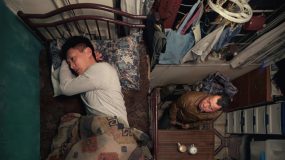
The Mad World is a film based on a news story directed by Wong Chun in 2016. The film only took two weeks to shoot, spent only HK$2 million, and won the First Hong Kong Feature Film Initiatives. In an attempt to arouse the public’s attention towards mentally disordered people, the film shows, from the perspective of a former psychopath patient, how hard it is for them to re-enter society no matter how normal they are and how many efforts they’ve made.
The movie started with the discharge of Ah Tung, a bipolar disorder patient who was sentenced to bedlam after accidentally killing his disabled mother when he was trying to take care of her one year ago. Ah-Tung followed his father back to the father’s living space in a tiny Subdivided Flat (劏房) located in Kowloon City (九龍城), which is also where most of the following stories took place. Tung’s father introduced the son to the room which is nowhere larger than that to host 2 people. In the setting, all the sundries, including the TV, are closely put on one side of the room while the other is just enough to allow a double-deck bed with a table in the centre of the room. The space was too small that the father had to fold the table and put it to the side to make a 2-step-wide space when Ah Tung was introduced to the room. The room was painted in a blackish-dark green, which might be designed to make the room look more spacious but further increases the feeling of tension and oppression. It is also later in a scene taken on the rooftop that showed the whole area of Tong Lau surrounded by the modern high-rises nearby as a symbol of how the lower-class fight for existence in the city. Under such context, housing is simply a shelter for underprivileged people. But for a psycho patient, this place is not even a shelter – the tiny and crowded space squeezes his heart and leads to the relapse of depression.
Audiences are later introduced to their neighbour – Mr. Yu and her mother’s family who also live in a similar situation through the narrow corridor. From Yu’s mother’s rhetorical question on whether Yu want his child to live in the same condition in the future, to Yu’s words to his plants asking it to grow upward and be positive, it showed their yearning towards, and how they want to have the kid (Mr. Yu) to have a bright future despite their current terrible living conditions.
Later in the film, when Tung’s father is injured in a traffic incident, conflict arises, but they speak out the words deep in their hearts. Tung wanted his father to stay in the hospital to recover his foot, but the father insisted on going back home and making sure Tung had his pills. Having been evading his wife’s disease for years and eventually losing her, the father knows he cannot continue avoiding it. He has to start taking action personally by caring for his son, just like how the son took care of her mother. In contrast, the former bipolar-disordered patient always wanted to show that he is as normal as every other member of society. From then on, he promised his father to take care of the older man, so he tries very hard to find an occupation. However, the society is far worse than he expected. He was very close to some jobs but eventually lost the position after speaking of his past year having mental disorder. Like what Tung said to Yu later in the film speaking of their plants, this place (Hong Kong) is not suitable for their (the plants, but also as a metaphor for the mentally-despaired) survival. Contrary to the innocent child’s words to turn the place into one suitable for the living of the plants, it would take far more effort to turn the place ideal for those with psychological diseases. Hearing the news that his former friend jumped off from a building due to pressure at work, and added that the surrounding was unable to understand and embrace him, Tung didn’t re-enter society but instead had his disorder happen again. What makes it even worse is that the people sharing the flat also forced them out of the place. The neighbors’ words “Spaces; there are no spaces at all.” in the end of the film not only show the housing problem and how tight the spaces were but also reflected the public attitudes. No matter how hard they tried to navigate through life, the reality always turns out to show that people’s extreme attitude towards psycho patients that simply hearing the words will make them scared away.
Jinheng, Liu 3035951959
There is a precise summary of the film plots in your work. Able to discuss some social issues illustarted in the film in your podcast.
However, please note that the assignment is not just a film review so you should have conducted field trip to understand your area of investigation (since the assignment is a fieldwork report!). You should also include more analysis on the spaces (e.g. the caged home, the rooftop) and how they supported the narratives and facilitated the ambience of the storytelling. Moreover, this assignment was expected to be a pair work with interactions that would engage students. It is a pity that these conversational qualities are missing in the podcast.